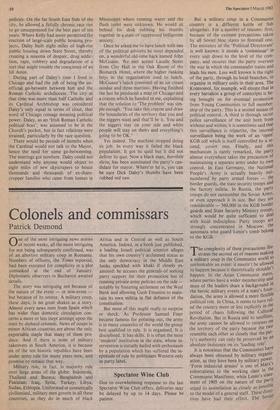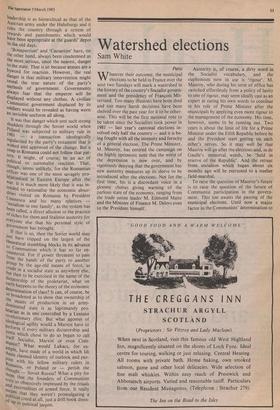Colonels and commissars
Patrick Desmond Onc of the most intriguing news stories of recent weeks, all the more intriguing for not being subsequently confirmed, was of an abortive military coup in Romania. Numbers of officers, the Times reported, had been executed for complicity in a plot unmasked at the end of January. Diplomatic observers in Bucharest awaited details.
The story was intriguing not because of the nature of the event — or non-event — but because of its source. A military coup, these days, is no great shakes as a story. Almost every news item from Spain which_ has wider than domestic circulation con- cerns a more or less inept attempt, upon the state by diehard colonels. News of coups in minor African countries are about the only exportable staple that many of them pro- duce. And if there is none of military takeovers in South America, it is because six of the ten historic republics have been under army rule for many years now, and promise to remain that way.
Military rule, in fact, is majority rule over large areas of the globe: Indonesia, Thailand and Burma; Bangladesh and Pakistan; Iraq, Syria, Turkey; Libya, Sudan, Ethiopia. Uniformed or cosmetically civilianised, military men govern in all these countries, as they do in much of black Africa and in Central as well as South America. Indeed, in a book just published, a leading Israeli political scientist alleges that his own country's acclaimed status as the only democracy in the Middle East looks speckled with khaki if closely ex- amined: he accuses the generals of seeking party support for their promotion but of running private army policies on the side — notably by fostering settlement on the West Bank and allowing Oush Emunim to main- tain its own militia in flat defiance of the constitution. • But none of this ought really to surprise or shock. As Professor Samuel Finer became famous for pointing out, the army is in many countries of the world the group best qualified to rule. It is organised. It is disciplined. It has skills. It is often the most 'modern' institution in the state, whose in- tervention is initially hailed with enthusiasm by a population which has suffered the in- eptitude of rule by politicians Western only in party label.
But a military coup in a Communist country is a different kettle of fish altogether. For a number of reasons: first, because of the extreme precautions taken by all Soviet bloc states to forestall one. The existence of the 'Political Directorate' is well known: it instals a 'commissar' in every unit down to the level of the com- pany, and ensures that the party oversees the way in which the commander trains and leads his men. Less well known is the right of the party, through its local branches, to organise in military units in their area. The Komsomol, for example, will ensure that in every battalion a group of conscripts is be- ing brought on for eventual promotion from Young Communists to full member- ship of the party. This is a second means of political control. A third is through secret police surveillance of the unit both from without and within; it is sometimes said that this surveillance is tripartite, the internal surveillance being the work of an 'open' KGB cell which is itself controlled by a se- cond, covert one. Finally, and this mechanism is rarely remarked, the party almost everywhere takes the precaution of' maintaining a separate army under its own control. In East Germany, the National People's Army is actually heavily out- numbered by party armed forces — the border guards, the state security troops and the factory militia. In Russia, the partY troops do not outnumber the Soviet ArmY, or even approach it in size. But they are considerable — 560,000 in the KGB border guards and State Security Ministry troops, which would be quite sufficient to deal with local indiscipline. Party troops are strongly concentrated in Moscow: the automata who guard Lenin's tomb belong to the KGB.
The complexity of these precautions Wu- strates the second set of reasons making a military coup in the Communist world sn unthinkable an event: it mustn't be allowed to happen because it theoretically shouldn't happen. In the Asian Communist states, where parties have a wider membership and most of the leaders share a background In the heroic military events of a state's foun- dation, the army is allowed a more flexible political role. In China, it seems to have rul- ed the country more or less explicitly in the period of chaos following the Cultural Revolution. But in Russia and its satellites, the army cannot be allowed to trespass on the territory of the party because the two resemble each other so closely that the Par- ty's authority can only be preserved by an absolute insistence on its 'leading role'. It is notorious that the Communists have always been obsessed by military orgams- ation, as they have been by military power. 'Form industrial armies' is one of Marx s exhortations to the working class in the Communist Manifesto, while Lerlill'S state- ment of 1905 on the nature of the PartY
urged its assimilation as closely as possible to the model of a general staff. These direc- tives have had their effect. The Soviet
leadership is as hierarchical as that of the Austrian army under the Habsburgs and it rules the country through a system of rewards and punishments which would have been appropriate at the guards' depot 10 the old days.
'Bonapartism' and 'Caesarism' have, on the other hand, always been condemned as the most,serious, since the nearest, danger to the state. That is so because armies are a byword for reaction. However, the real danger is that military intervention might reveal the true nature of the party's methods of government. Governments
always fear that the emperor will be displayed without any clothes. A. civilian Communist government displaced by its soldiers would be revealed as having worn an invisible uniform all along.
It was that danger which sent such strong Shudders through the Soviet world when Poland was subjected to military rule in
1981 — a transaction ideologically regularised by the party's testament that It
wished and approved of the change. But a
coup in Romania could not follow that pat- tern. It might, of course, be an act of
P°Iitical or nationalist reaction. That,
though, seems unlikely, for the Romanian officer was one of the most savagely pro- letarianised in Eastern Europe after the
war. It is much more likely that it was in- tended to rationalise the economic absur-
dities visited on Romania by President Feausescu and his many relatives — socialism in one family', as the system has been called, a direct allusion to the practice of riches for them and Stalinist austerity for everyone else that his personal style of government has brought.
If that is so, then the Soviet world may Just have tripped on the largest of the
theoretical stumbling blocks in its advance to Communism which it has so far en- c‘.ountered. For if power threatens to pass
from the hands of the party to another
gr°uP by the age-old means of force, as Frude in a socialist state as anywhere else,
bin then to be exercised in the name of the
dictatorship of the proletariat, what on earth happens to the theory of the economic determination of class? It can, of course, be so broadened as to show that ownership of t.he .means of production in an army- inotrunated state is as legitimately pro- 'etarian as in one controlled by a Leninist Irevolutionary elite. But what agonies of Ideological agility would a Marxist have to Perform if every military dictatorship and ludta which chose to do so began to call tself Socialist, Marxist or even Corn- ttlunist? What would Lukacs, for ex-
atnpie, have made of a world in which ldi
Ptinin claimed identity of outlook and pur- 113;e with his fellow military rulers in thegnania, or Poland or — perish the 1,°ught — Soviet Russia? What a pity for wit, ern that the founders of Communism ar ere so obsessively impressed by the rituals externalities of armed force. It really ulea.ns that they weren't promulgating a el/d°1111eal creed at all, just a drill book dress- up in political jargon.















































 Previous page
Previous page